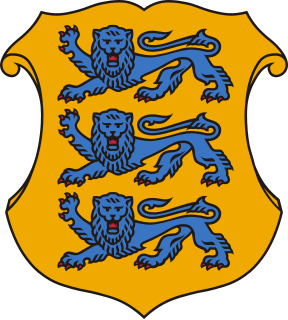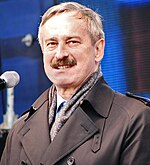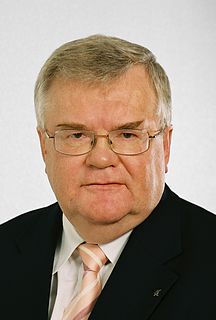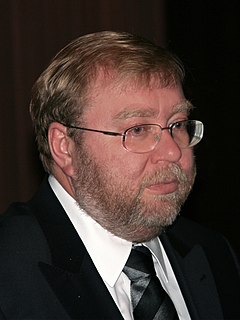| |||||||||||||||||||||||||||||||||
101 seats in the Riigikogu 51 seats were needed for a majority | |||||||||||||||||||||||||||||||||
|---|---|---|---|---|---|---|---|---|---|---|---|---|---|---|---|---|---|---|---|---|---|---|---|---|---|---|---|---|---|---|---|---|---|
| |||||||||||||||||||||||||||||||||
| |||||||||||||||||||||||||||||||||
Parliamentary elections were held in Estonia on 5 March 1995. [1] The governing parties were heavily defeated, except for the Reform Party, the successor of Estonian Liberal Democratic Party. The biggest winner was election cartel consisting of Coalition Party and its rural allies. The cartel won 41 seats which is the best result in Estonian parliamentary election so far.

Estonia, officially the Republic of Estonia, is a country in Northern Europe. It is bordered to the north by the Gulf of Finland with Finland on the other side, to the west by the Baltic Sea with Sweden on the other side, to the south by Latvia (343 km), and to the east by Lake Peipus and Russia (338.6 km). The territory of Estonia consists of a mainland and 2,222 islands in the Baltic Sea, covering a total area of 45,227 km2 (17,462 sq mi), water 2,839 km2 (1,096 sq mi), land area 42,388 km2 (16,366 sq mi), and is influenced by a humid continental climate. The official language of the country, Estonian, is the second most spoken Finnic language.

The Estonian Reform Party is a liberal political party in Estonia. The party is led by Kaja Kallas and has 34 members in the 101-member Riigikogu, making it the largest party in the legislature.
Contents
National Coalition Party "Fatherland" (Rahvuslik Koonderakond Isamaa) and Estonian National Independence Party formed an electoral cartel this time, nevertheless they got only eight seats in Riigikogu. Electoral list Right-wingers which included members of Fatherland splinter group Republicans’ and Conservatives’ People’s Party managed to pass the threshold with exactly 5% share of votes.
Pro Patria National Coalition Party was an Estonian political party founded in 1992. In 1995 it merged, with the Estonian National Independence Party, into Pro Patria Union.

The Riigikogu is the unicameral parliament of Estonia. All important state-related questions pass through the Riigikogu. In addition to approving legislation, the Riigikogu appoints high officials, including the Prime Minister and Chief Justice of the Supreme Court, and elects the President. The Riigikogu also ratifies significant foreign treaties that impose military and proprietary obligations, bring about changes in law, etc.; approves the budget presented by the government as law and monitors the executive power.
Social Democrats and Rural Centre Party presented a joined list again and soon after the election formed a new party called Moderates.
Election newcomer was Our Home is Estonia!, a Russian ethnic minority cartel. Among the lists that didn’t pass the threshold were a cartel known as the Fourth Power, formed consisting of the Royalists and Greens.
The defeat of the governing centre-right parties came as no surprise as the coalition parties had already been defeated in the 1993 local elections. The majority of the voters were disenchanted with coalition’s shock therapy policies and scandals which had already brought about the dismissal of Prime Minister Mart Laar. Laar’s premiership was also characterised with internal fights between coalition partners as well as different groups in his own Fatherland party. This led to a split in 1994, when several groups left Fatherland party. The winning KMÜ, while declaring to represent "right-wing politics", ran on a populist campaign highly critical of the previous center-right governments, accusing them of injustice, pauperization of the people and selling out people's properties. "Fatherland" on the other hand asked in its programme rhetorically, "whether we would like to let to power those who led us under Soviet rule resolutely towards the abyss, do we want back bread cartons and the oppressing embrace of the great Eastern neighbour, do we want hyperinflation and pension queues? Or do we want to continue building up a free and wealthy society?". The main slogan of KMÜ was "Competence, Cooperation, Domestic Peace"; the "Fatherland" ran under slogans "Choose the Right" and "A Choice for the Thinking Person". [2]
In economics, shock therapy is the sudden release of price and currency controls, withdrawal of state subsidies, and immediate trade liberalization within a country, usually also including large-scale privatization of previously public-owned assets.

Mart Laar is an Estonian politician and historian. He served as the Prime Minister of Estonia from 1992 to 1994 and from 1999 to 2002. Laar is credited with having helped bring about Estonia’s rapid economic development during the 1990s. He is a member of the Pro Patria party.
Right-wing politics hold that certain social orders and hierarchies are inevitable, natural, normal, or desirable, typically supporting this position on the basis of natural law, economics, or tradition. Hierarchy and inequality may be viewed as natural results of traditional social differences or the competition in market economies. The term right-wing can generally refer to "the conservative or reactionary section of a political party or system".
After the election Coalition Party under the leadership of Tiit Vähi and the rural parties formed government coalition with the Estonian Centre Party, the government collapsed, however, as early as autumn 1995, after the so-called Tape scandal. As a consequence, the Centre party was replaced with Reform Party in the government. This coalition which suffered from internal disagreements and clashes between free-market liberal Reform Party and centre-left rural parties ended in 1996, when Reform Party left the government. Coalition Party and its rural allies continued as minority government until the next regular election, March 1999. The governments under KMÜ generally continued with the free-market reforms and Western integration started under the "Fatherland" governments, with minor changes implemented.

Tiit Vähi is an Estonian politician who was Prime Minister of Estonia from 1995 to 1997. He was also acting Prime Minister for several months during 1992 under the transitional government.

The Estonian Centre Party is a centrist, social-liberal, populist political party in Estonia. It is one of the two largest political parties in Estonia and currently has 26 seats in the Estonian Parliament. The Party is a member of the Alliance of Liberals and Democrats for Europe (ALDE).











